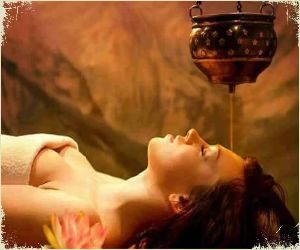Introduction to Ayurveda
Ayurveda, India’s Ancient System of Herbal Medicine:
 Ayurveda is the oldest form of health care in the world. It is considered the sister science of yoga and is said to have originated in India over 5000 years ago, at approximately the same time as the emergence of yoga. It is called the healing science of India and utilizes the blessings of nature and spirit to restore balance to the body. The very uniqueness of Ayurveda is that it does not fight with the body to control disease, but teaches us to harmonize our body and mind with the universal laws of nature, thereby removing the very roots of disease.
Ayurveda is the oldest form of health care in the world. It is considered the sister science of yoga and is said to have originated in India over 5000 years ago, at approximately the same time as the emergence of yoga. It is called the healing science of India and utilizes the blessings of nature and spirit to restore balance to the body. The very uniqueness of Ayurveda is that it does not fight with the body to control disease, but teaches us to harmonize our body and mind with the universal laws of nature, thereby removing the very roots of disease.
In Sanskrit, Ayur means life and Veda means knowledge or science, so the literal translation is “The Science of Life”. It is based on the one fundamental principle that health is the natural state of an individual as long as his/her body and mind are in harmony with nature (environment). Disease is the outcome of disharmony. Ayurveda is different from other health care systems in that it places emphasis on prevention at the root causes, instead of dealing with symptoms. Ayurveda emphasizes on the importance of food as our medicine, along with yoga, pranayama, meditation, herbal medication, and the cleansing, rejuvenation and detoxification of both body and mind.
What Should I Expect From an Ayurvedic Treatment?
Ayurvedic treatment focuses on restoring the natural harmony of your body and mind. When visiting an Ayurvedic doctor, he will ask for your medical history, check your pulse, palpate your abdomen, examine your tongue, eyes, nails, and skin, and listen to the tone of your voice. He will also ask you questions about your general state of health with special focus on your lifestyle, diet, habits, and environmental surroundings. Based on this assessment, our doctor will then make recommendations on how to restore your natural balance, which always includes changes in your lifestyle, a particular diet and the following practices:
- Pranayama:- Breathing exercises. Practicing pranayama generates more energy.
- Abhyanga:- massaging the skin with herbal oil to increase blood circulation and draw toxins out of the body through the skin.
- Rasayana:- using mantras (repeated words or phrases) during meditation combined with specific rejuvenating herbs.
- Yoga:- combining pranayama, movement, and meditation. It has been shown to improve circulation and digestion, and to reduce blood pressure, cholesterol levels, anxiety, and chronic pain.
- Pancha karma:- cleansing the body of toxins to purify it and reduce cholesterol. Practitioners use methods to induce sweat, bowel movements and even vomiting, in an effort to cleanse the body of toxins.
- Herbal medicines:- herbs are prescribed to restore dosha balance.
Salient Features of Ayurveda
- 100% Safe: Ayurveda uses all Natural herbal medicines having no side effects.
- Deep healing: Ayurveda goes to the root of the problem and does not only suppress the external symptoms.
- Comprehensive method: Ayurveda uses special diet, yoga, breathing techniques and meditation for complete restoration of the body and mind.
- Clean: Ayurveda detoxifies the body from years of toxin and tension build-up.
- Both preventive as well as curative treatments.
So Contact Us today and get started on your journey towards optimal health and well being!

